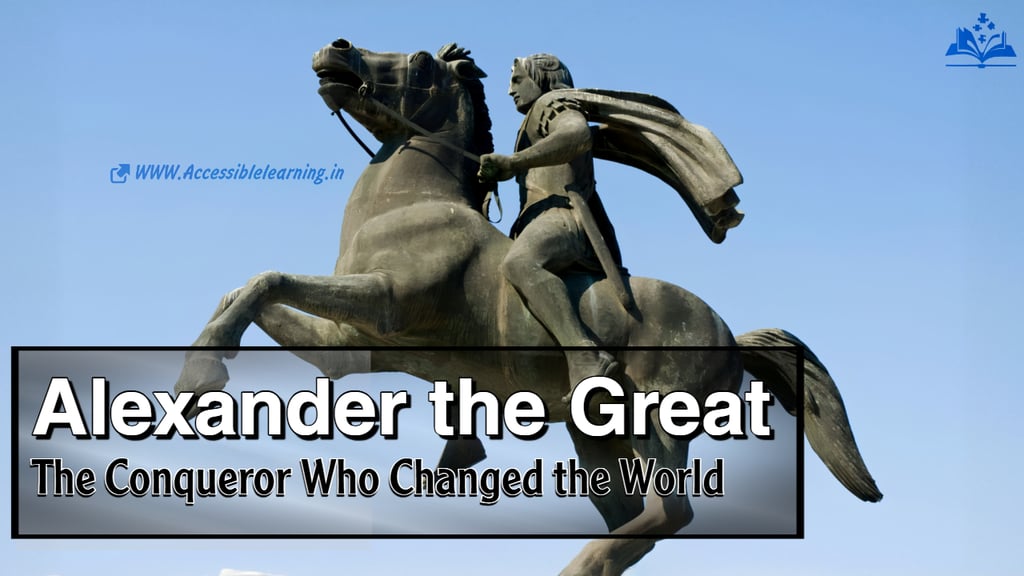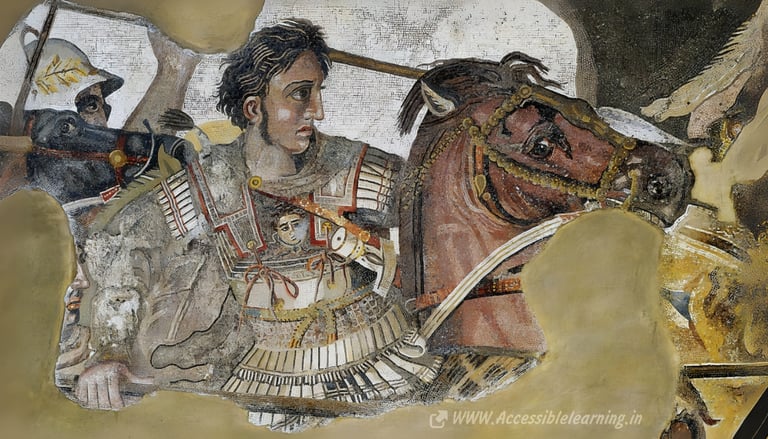
The World-Shaping Empire of Alexander the Great?
the fascinating life of Alexander the Great, one of history's most legendary figures. From his early life and education under Aristotle to his unparalleled military conquests, this article delves deep into his rise to power, the creation of his vast empire, and the profound cultural and intellectual legacy he left behind. Learn about his strategies, his vision for a unified world, and how his influence shaped both Eastern and Western civilizations. Alexander's impact is still felt today, as his extraordinary journey continues to inspire leaders and scholars across the globe.
EUROPEAN UNIONEMPIRES/HISTORYEDUCATION/KNOWLEDGETHE GREAT LEADER
Kim Shin
2/5/20257 min read


Alexander the Great, one of history's most iconic figures, left an indelible mark on the world through his extraordinary military campaigns and the vast empire he built. Born in 356 BCE in Pella, the ancient capital of Macedonia, Alexander's story is one of ambition, brilliance, and an unrelenting drive for conquest. In a relatively short span of time, he transformed the ancient world, expanding his empire from Greece to Egypt and as far east as India.
Early Life and Education
Alexander's life began under extraordinary circumstances. He was the son of King Philip II of Macedonia and Queen Olympias. His birth was considered a sign of great things to come, with many legends surrounding it. Some even claimed that a bolt of lightning struck the temple of Artemis at Ephesus on the night of his birth, signaling the greatness of the boy who would grow up to become a king.
As a young prince, Alexander was tutored by none other than Aristotle, one of history's greatest philosophers. Under Aristotle's guidance, Alexander developed a deep appreciation for philosophy, science, and literature, which would later influence his leadership style and cultural policies. Aristotle’s teachings also helped Alexander appreciate the value of Greek civilization and its culture, which he would go on to spread throughout his empire.
Becoming King: The Path to Power
After his father’s assassination in 336 BCE, Alexander ascended to the throne at the age of 20. His early years as king were marked by efforts to consolidate power and secure Macedonia’s borders. This included quelling uprisings in the Greek states and subduing rebellious territories. Alexander's first major military campaign was a remarkable success that set the stage for his later conquests.
Consolidation of Power
One of Alexander's first challenges as king was dealing with a revolt in Thebes. The city had revolted against his authority, and Alexander responded with overwhelming force. He decisively defeated the Theban forces and destroyed the city, selling its inhabitants into slavery and making an example of their resistance. This ruthless action sent a clear message to other Greek city-states that Alexander would not tolerate defiance.
Alexander also sought to solidify his position through diplomacy, forging alliances with several Greek states. His charm, charisma, and tactical acumen helped him unite Greece under his leadership. By 334 BCE, he was ready to embark on his grand campaign to conquer the Persian Empire.
The Conquest of the Persian Empire
In 334 BCE, Alexander set his sights on the Persian Empire, then ruled by King Darius III. With an army of approximately 35,000 soldiers, he crossed into Asia Minor and began a series of battles that would ultimately lead to the collapse of the Persian Empire.
The first significant battle was the Battle of Granicus in 334 BCE, where Alexander's forces decisively defeated the Persian army. This victory opened the door for his conquest of Asia Minor. Over the next several years, Alexander's forces won several key battles, including the Battle of Issus (333 BCE) and the Battle of Gaugamela (331 BCE), which effectively sealed his conquest of Persia.
Throughout his campaigns, Alexander was known for his tactical brilliance. His ability to outmaneuver and outthink larger, more experienced armies was a hallmark of his success. He often employed innovative battle strategies, such as the use of the phalanx formation, which proved crucial in his victories. His personal bravery on the battlefield was legendary, and he would often lead his troops from the front, inspiring them to follow him into battle.
Egypt and Founding of Alexandria
In 332 BCE, after his conquest of Persia’s territories, Alexander marched into Egypt, where he was hailed as a liberator. The Egyptians, who had long suffered under Persian rule, welcomed him as their new ruler. During his time in Egypt, Alexander founded the city of Alexandria, which would later become one of the most important cultural and intellectual centers of the ancient world.
Alexander's relationship with Egypt was also shaped by religion. The Egyptians, believing him to be a god, made him their Pharaoh, and he embraced this role. The city of Alexandria would go on to become a beacon of learning, home to the famous Library of Alexandria, which housed knowledge from around the ancient world. Alexandria's strategic location on the Mediterranean also made it a vital hub for trade, further cementing its importance in the ancient world.
The Journey to India: Crossing the Boundaries of the Known World
With the Persian Empire firmly under his control, Alexander turned his attention eastward toward India. In 326 BCE, he crossed the Indus River, marking the beginning of his invasion of India. His forces encountered the Indian king Porus at the Battle of the Hydaspes, one of Alexander’s most difficult and hard-fought victories. Despite facing elephants in battle, Alexander’s forces emerged victorious, but his soldiers, worn out and longing to return home, refused to march further east.
The Battle of the Hydaspes is noteworthy not just for its military significance but also for the strategic decisions Alexander made. Porus, who had a large number of war elephants, was a formidable opponent, but Alexander’s use of terrain, surprise tactics, and psychological warfare helped him secure victory. After the battle, Alexander treated the defeated Porus with great respect, even allowing him to retain his kingdom, a move that was uncharacteristic for many conquerors of the time.


Death and Legacy
In 323 BCE, while in the palace of Nebuchadnezzar II in Babylon, Alexander fell ill and died at the age of 32. His sudden death left his vast empire without a clear successor, leading to a period of chaos and division. His generals, known as the Diadochi, divided the empire among themselves, but none could replicate Alexander's success or maintain the unity he had forged.
Despite his early death, Alexander’s legacy is immeasurable. He spread Greek culture and ideas across vast swathes of the ancient world, leading to the Hellenistic Age—a period of cultural fusion between Greek, Persian, Egyptian, and Indian influences. His cities, most notably Alexandria, became centers of learning and trade, and his vision of a united world continued to shape the cultures of the East and West for centuries.
Alexander’s Influence on Future Generations
Alexander’s influence extended far beyond his lifetime. His military strategies became textbooks for later generals, including those of the Roman Empire and even Napoleon Bonaparte. His empire, though short-lived, proved that one man’s vision could alter the course of history, leaving behind a legacy of leadership, military genius, and cultural exchange.
Moreover, Alexander’s image as a godlike figure persisted in popular imagination. In both Western and Eastern cultures, he was revered as an unparalleled conqueror. His name was invoked by kings and emperors, including the Seleucid and Ptolemaic dynasties, who sought to align themselves with his greatness.
Cultural Integration and the Hellenistic Influence
One of Alexander's most significant contributions was his promotion of cultural integration. Throughout his empire, he encouraged the blending of Greek and local customs, religious practices, and art forms. This led to the rise of the Hellenistic culture, which was characterized by a mix of Greek, Egyptian, Persian, and Indian influences. Alexander himself adopted elements of Persian dress and customs, including the Persian title "Shahanshah" (King of Kings), and encouraged his soldiers to marry local women, further promoting the fusion of cultures.
The Hellenistic Age brought about advancements in science, art, and philosophy. Cities like Alexandria, Antioch, and Pergamon became intellectual centers, attracting scholars, mathematicians, and scientists. The Museum of Alexandria and its library became famous for housing works by the likes of Euclid, Archimedes, and Galen, fostering a golden age of intellectual achievement.
In terms of art, Hellenistic sculptures became more dynamic and expressive, moving away from the idealized, static forms of earlier Greek art. The Laocoön Group, a sculpture that captures intense emotion and movement, exemplifies the Hellenistic artistic style.
Alexander’s Religious Policies and Divinity
Alexander's religious policies were as ambitious as his military campaigns. He sought to position himself as a godlike ruler, often using religious symbolism to consolidate his power. In Egypt, he was recognized as the son of Amun, a major deity in Egyptian religion. He visited the Oracle of Siwa in the Libyan Desert, where he was reportedly declared the son of Amun, thus cementing his divine status.
In Persia, Alexander also adopted many Persian royal customs and was recognized as the legitimate successor to Darius III. He implemented religious tolerance in his empire, which helped to keep peace among the diverse cultures and peoples under his rule. This allowed Alexander to gain the loyalty of the conquered territories by showing respect for their traditions and deities.


Alexander the Great's life is a testament to the power of vision, ambition, and strategy. His campaigns changed the political and cultural landscape of the ancient world, leaving an enduring legacy that continues to fascinate historians and scholars to this day. Though his empire did not survive intact, his accomplishments remain a significant chapter in human history. His quest for knowledge, military innovation, and cultural impact make him not just a conqueror, but a symbol of the potential of the human spirit to transcend the limits of time and space.
Alexander's extraordinary journey not only reshaped the map of the ancient world but also set the stage for future cultural, political, and intellectual advancements that would echo through the centuries, influencing civilizations across the globe. His blending of Eastern and Western cultures through the Hellenistic Age laid the groundwork for the next great empires of the ancient world, shaping the course of history for generations to come.
Subscribe To Our Newsletter
All © Copyright reserved by Accessible-Learning Hub
| Terms & Conditions
Knowledge is power. Learn with Us. 📚


